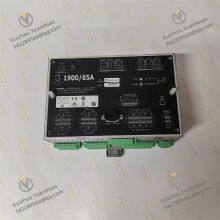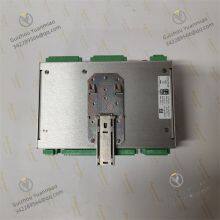Material
Other, Global universal model
Condition
Other, Global universal model
Task
Other, Global universal model
Mathematical Model
Other, Global universal model
Signal
Other, Global universal model
Customized
Non-Customized
Structure
Other, Global universal model
Operating Temperature
-40°C to +70°C
Humidity
5% to 95% (non-condensing)
I. Product Overview
1900/65A-00-00-01-00-01 is a device with important applications in the field of industrial control and automation. Judging from its model characteristics and the attributes of common equipment in the industry, it is most likely a type of control module or monitoring unit, undertaking key control and monitoring tasks in various automated systems of industrial production.
This product inherits the consistent compact and practical style of industrial equipment. Although specific size data is not available yet, referring to the design of similar industrial control modules, its size should be optimized to adapt to the complex installation spaces in industrial sites. It can be flexibly installed either in dense control cabinets or integrated into the control nodes of large automated production lines. In terms of weight, considering the need for easy installation and maintenance of industrial equipment, it should be relatively lightweight, facilitating operators in carrying, installing, and replacing it, and reducing operational inconvenience caused by heavy equipment.
The product shell is made of durable metal or high-performance engineering plastics, with good protective performance. In industrial environments, it can effectively protect internal electronic components and circuit systems from common conditions such as dust, oil stains, and slight vibrations, ensuring stable operation of the equipment even under relatively harsh working conditions and providing a guarantee for the continuity of industrial production.

II. Performance Characteristics
(1) Precise Control Capability
1900/65A-00-00-01-00-01 has precise control capability, which can accurately regulate connected equipment or process flows according to preset programs and parameters. It adopts advanced control algorithms, can quickly respond to changes in input signals, and output corresponding control instructions according to set logic. For example, in an automated production line, when a sensor detects a change in the position of materials, this product can quickly process this signal and timely adjust the actions of relevant actuators (such as motors, valves, etc.), ensuring that the production process proceeds according to the predetermined rhythm and improving production accuracy and efficiency.
(2) Stable Signal Processing
This product performs stably in signal processing, capable of accurately collecting, converting, and processing various input analog and digital signals. For analog signals (such as signals output by sensors for temperature, pressure, flow, etc.), it can perform high-precision analog-to-digital conversion, converting them into digital signals for system analysis and processing; for digital signals (such as switching signals), it can reliably identify and transmit them. The stable signal processing capability ensures that the data obtained by the system is accurate, providing a reliable basis for subsequent control decisions and avoiding control errors caused by signal processing errors.
(3) Good Compatibility
1900/65A-00-00-01-00-01 has good compatibility, enabling seamless connection with various common controllers, sensors, actuators, and other equipment in the industrial field. It supports a variety of common industrial communication protocols, such as Modbus and PROFINET, which allows it to be easily integrated into different industrial automation systems to exchange data and work collaboratively with other equipment. In an industrial system containing multiple brands and types of equipment, this compatibility effectively reduces the difficulty of system integration and improves the flexibility and scalability of the system.
(4) Reliable Operating Performance
The product uses high-quality electronic components and rigorous circuit design internally, ensuring its reliability and stability during long-term operation. It can adapt to a wide range of temperature and humidity in industrial environments and can maintain normal operation under conditions such as voltage fluctuations. At the same time, it may also have protection functions such as overcurrent, overvoltage, and short-circuit protection. When abnormal conditions occur, it can promptly cut off relevant circuits or issue alarms to protect itself and connected equipment from damage and reduce losses caused by faults.

III. Installation Steps
Preparation before installation: Before installation, carefully check whether the appearance of 1900/65A-00-00-01-00-01 is intact, and whether there is any damage, deformation, or missing parts. Compare with the product manual and packing list to confirm that the equipment model, specifications, and related accessories are complete and consistent. At the same time, inspect the installation environment to ensure that the installation location is dry, well-ventilated, away from strong electromagnetic interference sources, corrosive gases and liquids, and that the ambient temperature and humidity meet the operating requirements of the equipment. Prepare necessary installation tools such as screwdrivers, wrenches, wire crimpers, etc., and ensure the accuracy and integrity of the tools.
Electrical connection: Perform wiring operations strictly in accordance with the product's electrical wiring diagram, clearly distinguish between power interfaces, signal input and output interfaces, etc., to avoid equipment damage or failure caused by wrong wiring. When connecting the power cord, ensure that the voltage level is consistent with the equipment requirements, and the wiring is firm and reliable to prevent overheating and other problems caused by poor contact. When connecting signal lines, pay attention to the handling of the shielding layer to reduce the impact of electromagnetic interference on signal transmission. For communication lines, they need to be connected in accordance with the requirements of the corresponding communication protocol to ensure smooth communication. After wiring is completed, carefully check whether each connection point is firm and whether there is any looseness or short circuit.
Equipment fixing: According to the installation requirements of the equipment, select an appropriate installation method (such as rail mounting, panel mounting, etc.), and firmly fix 1900/65A-00-00-01-00-01 at the predetermined position. During the installation process, avoid severe impact and vibration on the equipment to prevent damage to internal components. Ensure that the equipment is installed stably without inclination, so as to facilitate subsequent maintenance and operation.












































